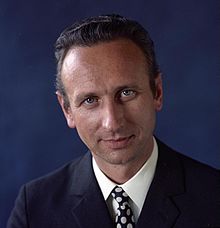Alexander Arnot
Alexander Arnot (born January 4, 1931 in Freiburg im Breisgau ) is a former German diplomat who was ambassador to Niger from 1970 to 1973 , to Hungary between 1989 and 1993 and to Ukraine from 1993 to 1996 .
Life
After graduating from high school , Arnot studied law at the University of Hamburg , the Albert-Ludwigs-University Freiburg and the Ruprecht-Karls-Universität Heidelberg and passed his second state examination in 1959 . He then joined the foreign service in 1960 and, after completing his career test, was employed at the embassy in Benin in 1962 . In May 1966 , he received his doctorate. jur. at the University of Hamburg with a dissertation on the right of resistance: Comments on current views in the Federal Republic of Germany .
In 1967 he worked at the headquarters of the Foreign Office in Bonn as a first-class legation councilor and advisor for NATO , WEU , military affairs and defense, before he was appointed ambassador to Niger in 1970 and held this office until he was replaced by Günter Joetze in 1973 . He then returned to the Foreign Office and was then first class counselor at the embassy in the Soviet Union in 1975 . He spent the following years at this embassy and was finally the ambassador's permanent representative in Moscow between 1984 and 1989 .
In 1989 he was appointed ambassador to Hungary, where he succeeded Hans Alfred Steger , who was retiring . During his work there, which lasted until 1993, Arnot witnessed the collapse of communism and the subsequent turning point in Hungary.
Most recently Alexander Arnot was ambassador to the Ukraine from 1993 until his retirement in 1996, where he was the successor to Hennecke Graf von Bassewitz . The question of assessing the immigration of Jewish quota refugees to the Federal Republic also played a role in these years . To this end, he led in a letter to the Bavarian CSU - member of parliament Günter Gabsteiger of:
- “Only in rare cases do Jewish applicants declare that they have a closer relationship with the Jewish faith. Most of them openly admit that they want to emigrate to Germany and not to Israel because…. the economic conditions in Germany are much better. A maximum of 40 percent of the admitted persons can be formally regarded as Jews. "
During his service there, he also came under fire because, despite cost-cutting measures, he demanded an “appropriate” residence in the form of a villa instead of a 400 square meter apartment. His successor in 1996 was the previous ambassador to Switzerland, Eberhard Heyken .
For many years he was involved in the cathedral council of the Berlin Cathedral .
Publications
- Right of Resistance: Comments on Current Views in the Federal Republic of Germany. Hamburg 1966
Web links
Individual evidence
- ↑ Bulletin, p. 40
- ↑ Files on the foreign policy of the Federal Republic of Germany 1968. Oldenbourg, Munich 1999, Volume 2, ISBN 3-486-56411-0 , p. 1660 ( digitized version )
- ↑ Ilse Dorothee Pautsch: Files on the Foreign Policy of the Federal Republic of Germany 1977. Oldenbourg Verlag, Munich 2008, ISBN 978-3-486-58338-0 , Volume 2, p. 1821
- ↑ Ambassador a. D. Arnot remembers 1989. ( Memento of April 1, 2016 in the Internet Archive ) In: Budapester Zeitung of March 7, 2009
- ↑ Snapshots 1989/90: GDR refugees in the Malteser camp, Budapest, September 10, 1989: In the refugee camp at the Zugliget Church
- ^ Wilhelm Dietl : Hocus pocus. Case Bubis (PDF; accessed April 1, 2016)
- ↑ Alexander Arnot , in: Der Spiegel , No. 41/1993
- ↑ Cathedral Church College of the Berlin Cathedral
| predecessor | Office | successor |
|---|---|---|
| Hennecke Count von Bassewitz |
Ambassador of the Federal Republic of Germany in Kiev 1993–1996 |
Eberhard Heyken |
| personal data | |
|---|---|
| SURNAME | Arnot, Alexander |
| BRIEF DESCRIPTION | German diplomat |
| DATE OF BIRTH | January 4, 1931 |
| PLACE OF BIRTH | Freiburg in Breisgau |
